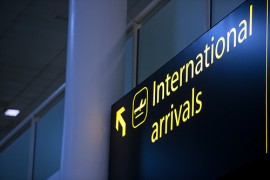Photo by Euro Realist Newsletter 
For 16 years, News-watch has been monitoring in interviews by the BBC of Ukip leader Nigel Farage.
It’s the broadcasting equivalent of painting by numbers.
With wearying predictability, each one has been essentially the same. Question one usually suggests they are racist by wanting immigration controls. Question two posits the party is a flash in the pan, and then that their electoral bubble has definitely burst. Voters are now realising that supporting the party was a bad mistake. And then comes number three: why are there so many nutters and closet Nazis in party ranks?
All the main presenters – from John Humphrys to James Naughtie and from Justin Webb and Evan Davis to Sarah Montague – have clearly been tutored in this mechanical interviewing approach, and none of them deviates beyond a few commas and names from the script.
The goal has been relentlessly and viciously the same: to discredit the party and its leader and to sabotage the chances that withdrawal from the EU is properly on the political agenda.
In any other organisation, such lack of originality would be considered a risible dereliction of duty, but this is the Biased Broadcasting Corporation, whose agenda is to attack UKIP’s core policies – restriction of immigration and departure from the EU – with every sinew of its £2bn-a-year news budget. Handling of the party by BBC presenters makes it blatantly obvious they are dealing with the political equivalent of the stench of rotting fish.
It was the turn of Today presenter Mishal Husain to have her crack at Mr Farage on Thursday morning. She did not disappoint – exactly true to form in terms of content. The right-on Ms Husain spiced it up by adopting a sharply judgmental, condescending and authoritarian tone. It was if she was dealing with someone who should be subjected to the worst excesses of Sharia law.
Section 1: Ms Husain attempted to show that Mr Farage’s concerns about communities becoming segregated as a result of the volume of immigration are actually racist. This is what the Corporation has done for years on the topic of immigration. It has been so blatantly obvious that BBC correspondents such as Nick Robinson have been forced to make apologies for it. But no matter: This is Ukip and any chance to discredit Mr Farage would clearly do for Ms Husain. Instead of having a sensible, grown-up exchange about the how immigration can be managed, Ms Husain preferred instead to descend into the broadcast equivalent of crude name-calling.
Section 2: Here, Ms Husain tried to rubbish the concept of an Australian-style cap on immigrant numbers. Her ammunition – which she fired with both barrels and with such vehemence that Mr Farage could scarcely get a word in edgeways – was that it is totally impracticable because it is hard to define what a skilled worker actually is and where such immigrants should come from. Mr Farage very patiently persisted that it was possible, but Ms Husain was having none of it. Her focus then shifted to suggesting that if there was a cap on immigrant numbers at all, it would be economically disastrous for Britain. Normally, the BBC hates big business, but here, Ms Husain invoked the authority of the CBI to posit that Ukip policies were dangerously misguided. Mr Farage then raised a very important point: that cohesion of communities is more important than economic wealth. Ms Husain ignored that and moved on….to
Section 3: Ms Husain kept to the script again, precisely. Now it was time to show that Ukip are a bunch of dangerous, venal nutters, and she had a string of names to prove her case. Her examples were larded with the usual alarming labels: Nazi, Adolf Eichmann…more painting by numbers. Mr Farage politely pointed out that other political parties have also had similar problems with candidates, but this did not make headlines. Ms Husain was totally unresponsive to his protests. She ploughed on with the theme and ensured that in several different ways she was able to tell the audience that Ukip members are dangerous extremists.
What remains clear is that as the election coverage gathers pace, the Biased Broadcasting Corporation has no intention of portraying Ukip and all it stands for as anything other than a dangerous aberration. The Commons European Scrutiny Committee recently highlighted that bias. One mercy is that the more these attacks continue, the more voters see through it- Ukip has risen despite the relentless opposition of the BBC. But the Husain interview illustrates graphically that many of the real issues of the campaign are not properly being discussed.
Read the full transcript below:






